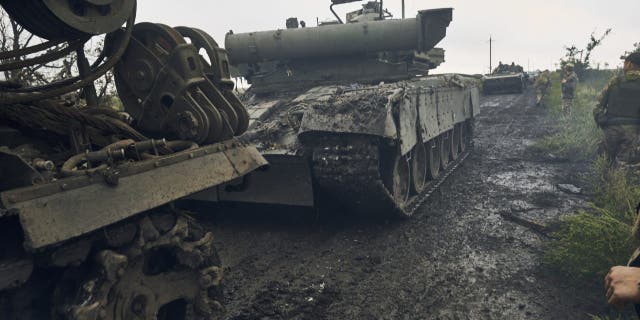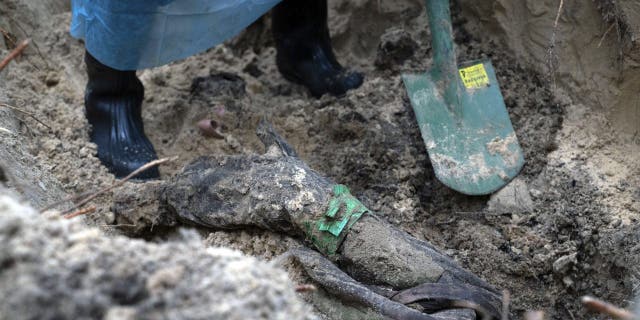NEWYou can now listen to Fox News articles!
EXCLUSIVE: Ukrainian forces continue to uncover gross human rights abuses and atrocities outside the eastern city of Izyum, including a mass grave site with several burn pits containing some 1,100 partially charred bodies this week, sources told Fox News Digital Thursday.
“Dead bodies smell the same everywhere,” special operations Marine veteran Chad Robichaux said, describing the grizzly sight he witnessed this week.
“The distinct smell of decaying people. Just to know that, that was women and children and non-combatants,” he continued before adding, “Russia has the most land in the world – comes in and takes more. And to just do this to these people who can’t defend themselves.
“It’s just hard not to be emotionally upset, angry. It’s just, it’s disgusting,” he added.
Bags with dead bodies are seen during the exhumation in the recently retaken area of Izyum, Ukraine, Friday, Sept. 16, 2022.
(AP Photo/Evgeniy Maloletka)
DECADES OF KREMLIN PREJUDICE IN DAGESTAN FUELS PROTESTS AMID PUTIN’S CONSCRIPTION DECREE
According to Robichaux and one of his partners with the Mighty Oaks Program – which has been in Ukraine since February assisting soldiers on the front lines with trauma and medical counseling – Ukrainian forces this week discovered a series of partially covered mass graves in an area one hour southeast of Izyum.
The special ops veteran said he was not permitted to disclose the exact location of the site but said it was clear Russian soldiers were trying to conceal evidence of war crimes.
Some 1,100 Ukrainian men, women and children, many with their hands bound behind their backs, were reportedly found in several pits roughly 20 feet by 30 feet that had been originally dug out to hide Russian tanks.
“They tried to burn the evidence of the bodies,” Robichaux said. “But they didn’t do a very good job of it.
“They actually left 74 tanks in this one area and they were using the tank positions to put the bodies in,” he explained.

Ukrainian troops retook a wide swath of territory from Russia on Monday, pushing all the way back to the northeastern border in some places, and claimed to have captured many Russian soldiers as part of a lightning advance that forced Moscow to make a hasty retreat.
(AP Photo/Kostiantyn Liberov)
Disturbing reports of extreme violence and war crimes committed against civilians, including other mass grave sites, evidence of torture, and the extreme living conditions Ukrainians were forced to endure during six months of Russian occupation, continue to emerge as Russian forces retreat from areas in southeast Kharkiv.
Russian forces have largely retreated from areas surrounding Izyum in southeast Kharkiv, but Robichaux explained that doesn’t mean Russian soldiers are no longer a threat.
“Just because Ukraine retakes control of an area doesn’t mean that equates to no Russians,” he said.
Robichaux described a chaotic scene and said he and his team were with Ukrainian forces on the front lines where attacks by Russian forces overhead and on the ground remain a very real threat.
At least 60 deceased Russian soldiers were found this week as they continued to advance in the area, along with 15 Russian troops who surrendered.
Reports of Russia’s inability to maintain command and control in its ranks have emerged in the weeks following Ukraine’s major counteroffensive, and, according to Robichaux, these issues stem from a lack of basic communication among Russia’s soldiers.
“They don’t have inner team communications like we would normally have, so they have no way to communicate,” he said adding they do not appear well-trained or even know how to navigate. “They’re just lost and walking around. Almost like they have to get picked up because they wouldn’t survive.”
Robichaux described the harsh dichotomy of war and said the Russian soldiers he’s seen were not only under-trained but young and “terrified.”
WARNING GRAPHIC IMAGE

Part of the body of a Ukrainian soldier is uncovered during an exhumation in the recently retaken area of Izium, Ukraine, Friday, Sept. 16, 2022.
(AP Photo/Evgeniy Maloletka)
CLICK HERE TO GET THE FOX NEWS APP
“You see these Russian soldiers, these kids who are like 18,19, 20 years old. It’s hard not to feel sorry for them because they’re just kids that were forced to be out there. But then they participated in this,” he said, referring to the litany of human rights abuses that have been reported.
The International Criminal Court and several nations, including the U.S. and its European allies, have opened investigations into the alleged war crimes.
But the special ops veteran argued the West should be doing more to help Ukraine win this war more efficiently and faster.
“Bullies don’t stop bullying until somebody walks across the playground and punches him in the face,” he said. “It’s a problem that won’t go away until somebody draws a line and does something about it.
“The world needs to know,” Robichaux added.